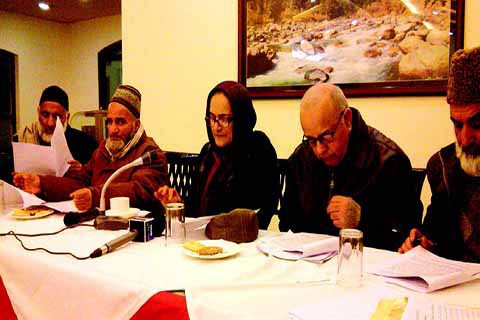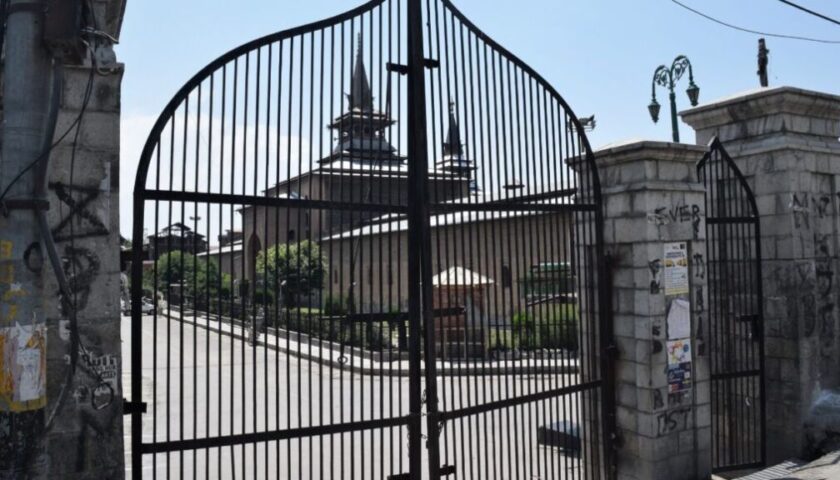 A civil society group Wednesday termed the police move of profiling people on sectarian lines as a well planned strategy to divide people of Kashmir and to divert people’s attention from the ‘main goal of right to self-determination.’ The group urged clerics to stand united and prepare people to defeat ‘New Delhi’s designs of triggering a sectarian rift in the Valley.’
A civil society group Wednesday termed the police move of profiling people on sectarian lines as a well planned strategy to divide people of Kashmir and to divert people’s attention from the ‘main goal of right to self-determination.’ The group urged clerics to stand united and prepare people to defeat ‘New Delhi’s designs of triggering a sectarian rift in the Valley.’
Addressing media persons here, Professor Hameeda Nayeem, chairperson of Kashmir Centre for Social and Developmental Studies (KCSDS), said that police move of profiling people on the basis of their sects seems to be part of a larger plan. “There have been census exercises in the past but the one carried out by the police is not only fishy but also a move to intrude into the people’s privacy,” she said. “Asking a Kashmiri citizen whether he belongs to Barelvi, Wahabi, Shia or Sunni sect is surprising and a move backed by New Delhi to trigger a sectarian war in Kashmir. The move, I believe, is aimed at diverting the attention of people of Kashmir from the right to self-determination.”
She said the profiling exercise must stop forthwith. “I urge the people of Kashmir including the heads of all religious bodies to defeat the designs of New Delhi on whose behest police carried out the profiling,” she said. “The exercise to seek details of Kashmiri people is a well thought out plan to damage the collective narrative.”
The group comprising noted industrialist Shakeel Qalander, DrJavaid Iqbal, Z G Muhammad, former Jamiat-e-Ahlihadith General Secretary Abdur Rehman Bhat and President of Anjuman-e-Himayatul Islam Moulana Khursheed Ahmed Qanoongoo, warned the State and New Delhi to desist from the “colonial project of profiling to divide Muslims into bits and pieces to create psychological war in the society for fulfilling their political motives.” The group warned of an agitation if the exercise of profiling people isn’t stopped forthwith.
Speaking on the occasion, Qalander said that the civil society urges all the heads of religious bodies and clerics no to fall in the “profiling trap” which is fraught with dangerous consequences. “Personal preferences must be kept personal like your personal relationships. We appeal all Kashmiri Muslims to keep these elements at bay and sink and swim together,” Qalander said. “We also urge the followers of different schools of thought to form a coordination committee in order to deal with this serious issue.” Qalander said that the police have already submitted the preliminary report to Union Minister of Home “on the basis of its profiling exercise carried out in Kashmir.” He said they had asked police to reveal the reasons behind carrying of profiling of people, but they failed. “The police silence over the issue made the entire exercise a fishy one forcing us to formulate a strategy to react,” Qalander said.
Jamiat-e-Ahlihadith General Secretary AbdurRehmanBhat said that seeking details from people on the basis of their sects is not a move to strength a particular group of a sect in Kashmir. “The exercise has the sole motive to trigger a sectarian division in Kashmir. Muslims in Kashmir are part of one Ummah and won’t fall prey to any design,” he said.
President of Anjuman-e-Himayatul Islam said that it’s high time people irrespective of cast, colour and creed unite for a cause.”
Columnists DrJavaid Iqbal and Z G Muhammad also stressed on forging unity among all sects in Kashmir.
The group unanimously laid emphasis on the declaration passed in a conference in 2005 wherein Ulema of all sects were present. The conference was held in Saudi Arabia where in scholars from Al-Azhar, Harmain, Makkah, Madina, eminent Ayatollahs from seminaries in Najaf including leader of Islamic Republic of Iran, AyotullahKhamnei, participated. The crux of the conference, according to KCSDS members, was anybody whosoever recites Shahadah, professing faith in Allah and Prophet Muhammad (SAW), offers Salah, fasts in Ramadhan, pays Zakah (charity) and performs Hajj is a Muslim and nobody has a right to take him otherwise or take recourse to Takfir (declaring someone outside the ambit of Islam).
“The declaration should be treated as the basis of ending sectarian division in Kashmir.”




